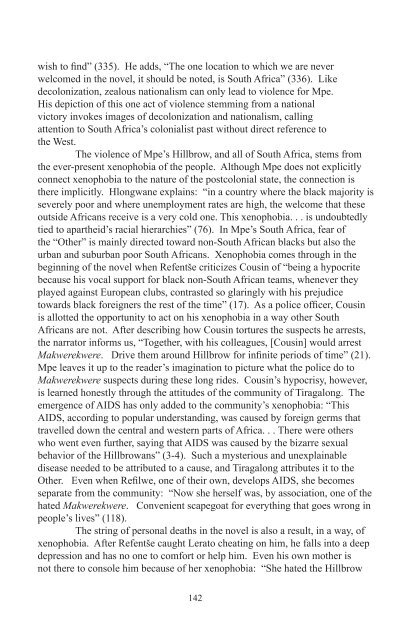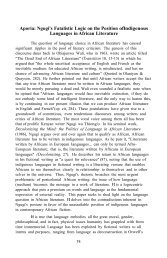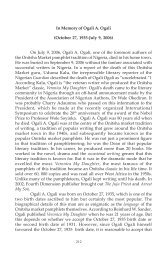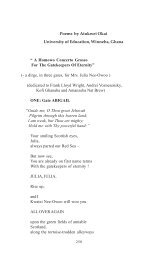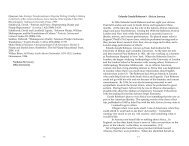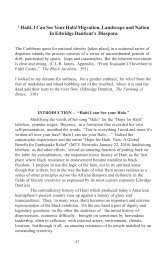Metafiction in Mpe's Welcome to our Hillbrow - African Literature ...
Metafiction in Mpe's Welcome to our Hillbrow - African Literature ...
Metafiction in Mpe's Welcome to our Hillbrow - African Literature ...
Create successful ePaper yourself
Turn your PDF publications into a flip-book with our unique Google optimized e-Paper software.
wish <strong>to</strong> f<strong>in</strong>d” (335). He adds, “The one location <strong>to</strong> which we are never<br />
welcomed <strong>in</strong> the novel, it should be noted, is South Africa” (336). Like<br />
decolonization, zealous nationalism can only lead <strong>to</strong> violence for Mpe.<br />
His depiction of this one act of violence stemm<strong>in</strong>g from a national<br />
vic<strong>to</strong>ry <strong>in</strong>vokes images of decolonization and nationalism, call<strong>in</strong>g<br />
attention <strong>to</strong> South Africa’s colonialist past without direct reference <strong>to</strong><br />
the West.<br />
The violence of Mpe’s <strong>Hillbrow</strong>, and all of South Africa, stems from<br />
the ever-present xenophobia of the people. Although Mpe does not explicitly<br />
connect xenophobia <strong>to</strong> the nature of the postcolonial state, the connection is<br />
there implicitly. Hlongwane expla<strong>in</strong>s: “<strong>in</strong> a country where the black majority is<br />
severely poor and where unemployment rates are high, the welcome that these<br />
outside <strong>African</strong>s receive is a very cold one. This xenophobia. . . is undoubtedly<br />
tied <strong>to</strong> apartheid’s racial hierarchies” (76). In Mpe’s South Africa, fear of<br />
the “Other” is ma<strong>in</strong>ly directed <strong>to</strong>ward non-South <strong>African</strong> blacks but also the<br />
urban and suburban poor South <strong>African</strong>s. Xenophobia comes through <strong>in</strong> the<br />
beg<strong>in</strong>n<strong>in</strong>g of the novel when Refentše criticizes Cous<strong>in</strong> of “be<strong>in</strong>g a hypocrite<br />
because his vocal support for black non-South <strong>African</strong> teams, whenever they<br />
played aga<strong>in</strong>st European clubs, contrasted so glar<strong>in</strong>gly with his prejudice<br />
<strong>to</strong>wards black foreigners the rest of the time” (17). As a police officer, Cous<strong>in</strong><br />
is allotted the opportunity <strong>to</strong> act on his xenophobia <strong>in</strong> a way other South<br />
<strong>African</strong>s are not. After describ<strong>in</strong>g how Cous<strong>in</strong> <strong>to</strong>rtures the suspects he arrests,<br />
the narra<strong>to</strong>r <strong>in</strong>forms us, “Together, with his colleagues, [Cous<strong>in</strong>] would arrest<br />
Makwerekwere. Drive them around <strong>Hillbrow</strong> for <strong>in</strong>f<strong>in</strong>ite periods of time” (21).<br />
Mpe leaves it up <strong>to</strong> the reader’s imag<strong>in</strong>ation <strong>to</strong> picture what the police do <strong>to</strong><br />
Makwerekwere suspects dur<strong>in</strong>g these long rides. Cous<strong>in</strong>’s hypocrisy, however,<br />
is learned honestly through the attitudes of the community of Tiragalong. The<br />
emergence of AIDS has only added <strong>to</strong> the community’s xenophobia: “This<br />
AIDS, accord<strong>in</strong>g <strong>to</strong> popular understand<strong>in</strong>g, was caused by foreign germs that<br />
travelled down the central and western parts of Africa. . . There were others<br />
who went even further, say<strong>in</strong>g that AIDS was caused by the bizarre sexual<br />
behavior of the <strong>Hillbrow</strong>ans” (3-4). Such a mysterious and unexpla<strong>in</strong>able<br />
disease needed <strong>to</strong> be attributed <strong>to</strong> a cause, and Tiragalong attributes it <strong>to</strong> the<br />
Other. Even when Refilwe, one of their own, develops AIDS, she becomes<br />
separate from the community: “Now she herself was, by association, one of the<br />
hated Makwerekwere. Convenient scapegoat for everyth<strong>in</strong>g that goes wrong <strong>in</strong><br />
people’s lives” (118).<br />
The str<strong>in</strong>g of personal deaths <strong>in</strong> the novel is also a result, <strong>in</strong> a way, of<br />
xenophobia. After Refentše caught Lera<strong>to</strong> cheat<strong>in</strong>g on him, he falls <strong>in</strong><strong>to</strong> a deep<br />
depression and has no one <strong>to</strong> comfort or help him. Even his own mother is<br />
not there <strong>to</strong> console him because of her xenophobia: “She hated the <strong>Hillbrow</strong><br />
142


